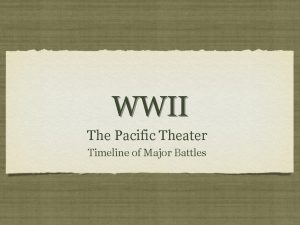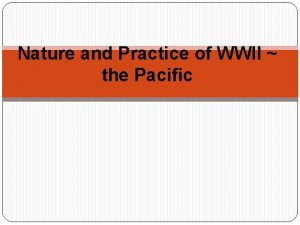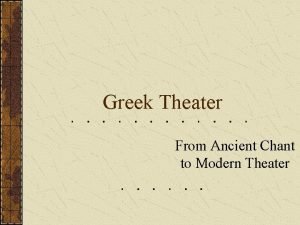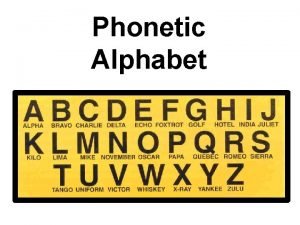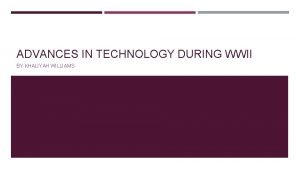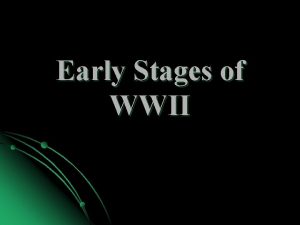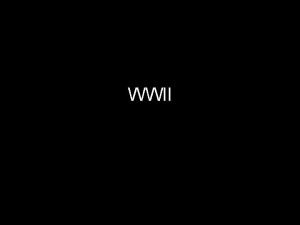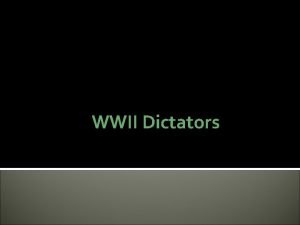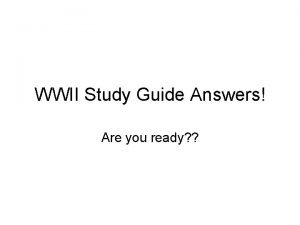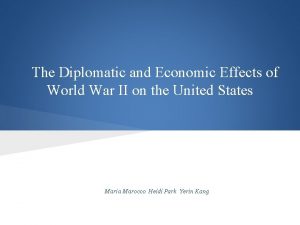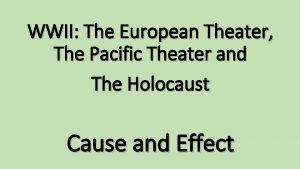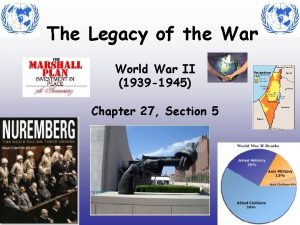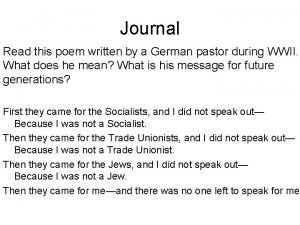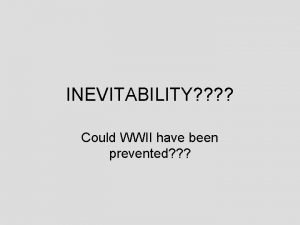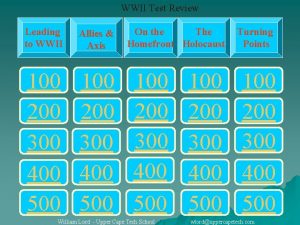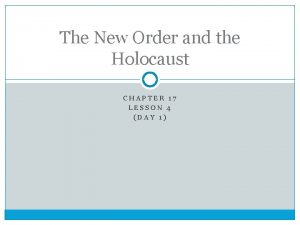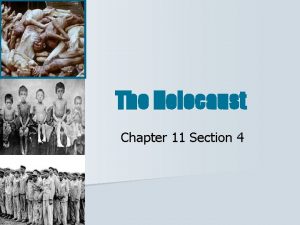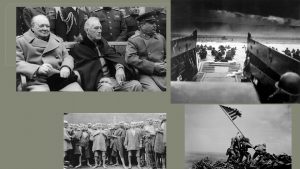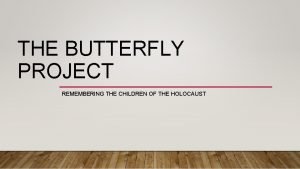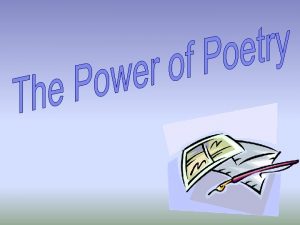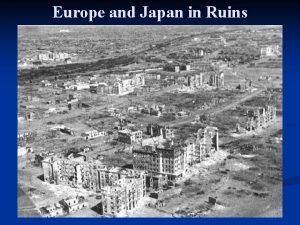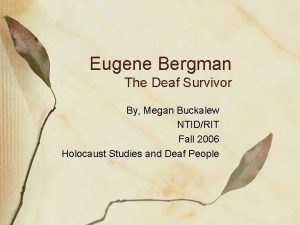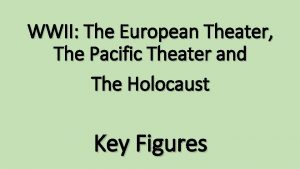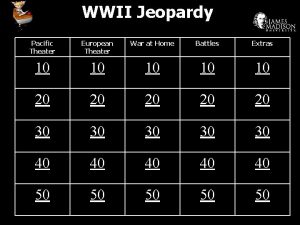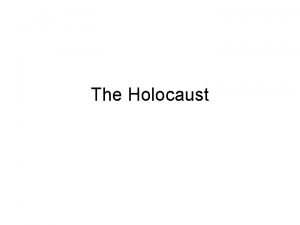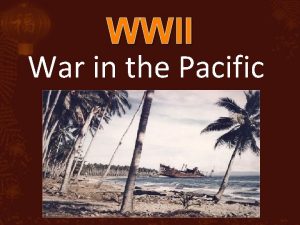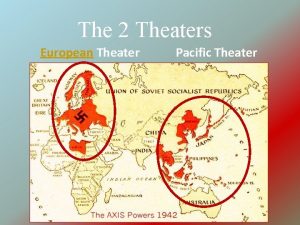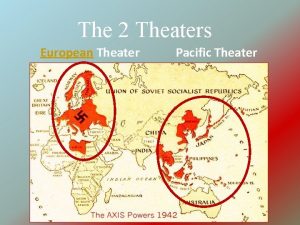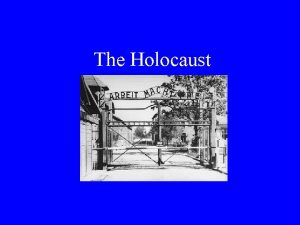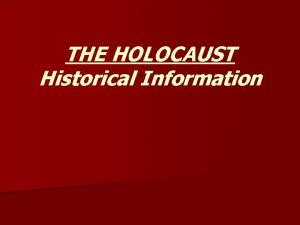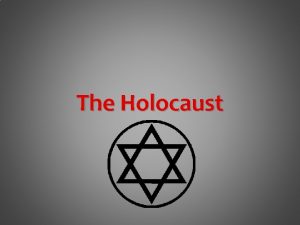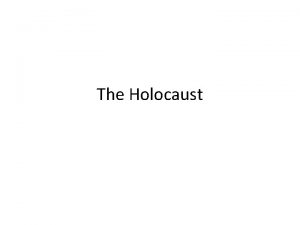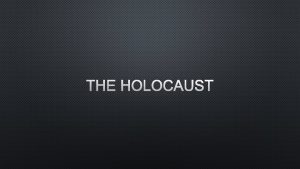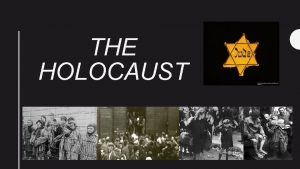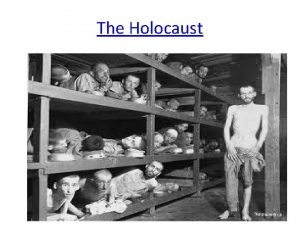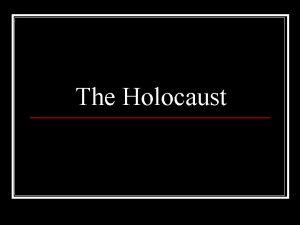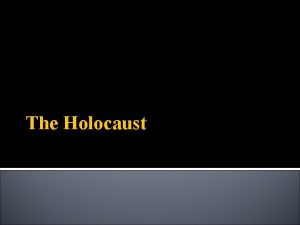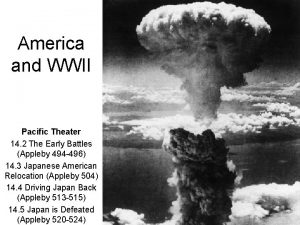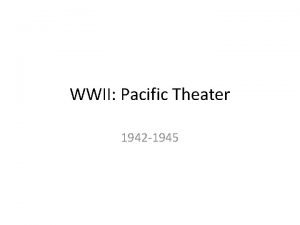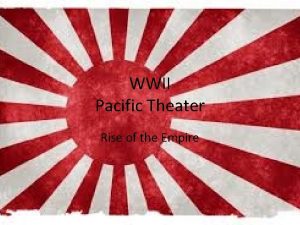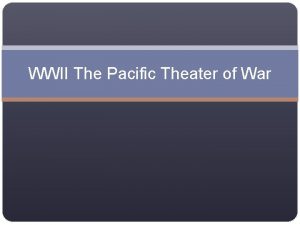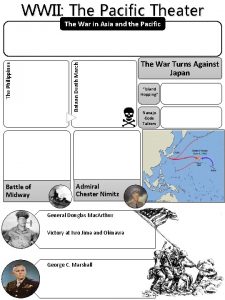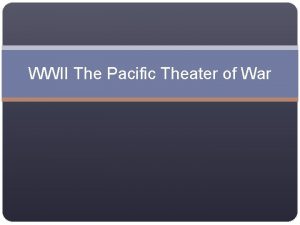WWII European Theater Pacific Theater and the Holocaust


























- Slides: 26

WWII: European Theater, Pacific Theater and the Holocaust VISUAL VOCABULARY

LEARNING OBJECTIVES: SS. 912. A. 6. 1 Examine causes, course, and consequences of World War II on the United States and the world SS. 912. A. 6. 2 Describe the United States response in the early years of World War II (Neutrality Acts, Cash and Carry, Lend Lease Act) SS. 912. A. 6. 3 Analyze the impact of the Holocaust during World War II on Jews as well as other groups SS. 912. A. 6. 6 Analyze the use of atomic weapons during World War II and the aftermath of the bombings SS. 912. A. 6. 7 Describe the attempts to promote international justice through the Nuremberg Trials SS. 912. A. 6. 9 Describe the rationale for the formation of the United Nations, including the contribution of Mary Mc. Leod Bethune

The European Theater Dictator: Fascism: A ruler who has absolute authority A system of government characterized by dictatorship, control of private business, repression of all opposition, and extreme nationalism and racism.

The European Theater Nazi Party: The Third Reich: The German National Socialist Party under Adolf Hitler, a belief in the dominance of the Aryan Race The Nazi dictatorship under Hitler (1933 -1945) The German Student

The European Theater Axis Powers: Allies: • WWII military alliance of Italy, Japan, Germany, and 6 other countries • WWII military alliance of Britain, France, Soviet Union, China, the U. S. , and 45 other countries

The European Theater Blitzkrieg: Maginot Line: • "lightning war"; swift attacks launched by Germany in WWII during the night • A line of defenses along the French Border with Germany

The European Theater Weimer Republic: Reichstag: The German government set up after WWI under Hindenburg that was overthrown by the Nazis The German Parliament which was burned down in 1933 which Hitler blamed on the communists.

The European Theater French Resistance: • Underground movement of French civilians • Fought against the Nazi Germans who occupied France during WWII Siege of Leningrad: • German blockade of the city of Leningrad that claimed 650, 000 Russian lives • After 872 days, the Russians forced the Germans to retreat

The European Theater Munich Conference: Non-Aggression Pact: • Meeting where European leaders used appeasement (giving in to aggression to avoid war) by giving Hitler the Sudetenland in exchange for a promise that Germany would not expand its territory any further. • A Pact between Russia and Germany • They agreed not fight each other during the war and in exchange, Germany would give the Soviet Union its half of Polish territory after the Germans conquered it Chamberlain, Daladier, Hitler, Mussolini, and Ciano

The European Theater Neutrality Acts: Battle of Britain: • A series of laws passed by congress from 1935 -1939 expressed American's desire for peace. • They prohibited shipment of US munitions to warring nations • Germans bombed Britain continuously but Britain resisted with fighter pilots and Hitler gave up invasion

The European Theater Lend-Lease Act: Atlantic Charter: • Military aid to Britain by the sale, lease, transfer, or exchange of arms and supplies • Agreement that the USA and Great Britain that set forth the peace aims of their governments for after the war.

The European Theater Operation Overlord: D-Day: • Code name for the Allied invasion of Europe in 1944 • Day of the invasion of Western Europe by Allied forces-June 6, 1944 (Allied forces landed at Normandy, France; freed Paris; slowly advanced to Germany)

The European Theater Battle of the Bulge: • German counter-attack that temporarily slowed the allied invasion of Germany (Audie Murphy was the hero) German soldiers race across street; destroyed US vehicles in the background Yalta Conference: • Meeting of Winston Churchill, Joseph Stalin and Franklin Roosevelt • The three leaders agreed to demand Germany’s unconditional surrender and began plans for a post-war world

The European Theater V-E Day: Potsdam Conference: • “Victory in Europe Day; ” Germany unconditionally surrenders to allied forces • The Big Three— Joseph Stalin, Winston Churchill, and U. S. President Harry Truman • Met in Potsdam, Germany, to negotiate the peace terms for the end of World War II

The Pacific Theater Pearl Harbor: Occupation of the Philippines: • Surprise aerial attack on the U. S. naval base at Pearl Harbor on Oahu Island, Hawaii, by the Japanese that caused the United States to enter World War II • Ten hours after Pearl Harbor, Japan invaded U. S. military bases in the Philippines • After U. S. forces retreated, Japan occupied the Philippines for three years. Bataan Death March: U. S. prisoners march 65 miles to prison camps

The Pacific Theater Japanese-American Internment: Battle of the Coral Sea: • People of Japanese ancestry in the U. S. were forced to relocate and imprisoned in camps • Sixty-two percent of the internees were U. S. citizens. • First naval and air battle in history • U. S. fleet turned back a Japanese invasion force

The Pacific Theater Battle of Midway: Kamikazes: • Naval battle, fought almost entirely with • Japanese pilots who deliberately aircraft, in which the United States flew their planes into U. S. naval destroyed Japan’s first-line carrier strength and most of its best trained vessels. naval pilots • Considered the turning point of the Pacific Theater.

The Pacific Theater Island Hopping: Battle of Iwo Jima: • Allied strategy of capturing Japanese-held islands to gain control of the Pacific Ocean • Marines landed on the Pacific island in what was the largest all. Marine battle in history. It was also the bloodiest in Marine Corps history.

The Pacific Theater Manhattan Project: Atom Bomb: • Code name for the secret US project set up in 1942 to develop an atomic bomb. A bomb that produces an extremely powerful explosion when atoms are split apart. Albert Einstein and Leo Szilard wrote to FDR warning of Germany’s efforts to create nuclear weapons

The Pacific Theater Potsdam Declaration: Hiroshima: • Ultimatum issued by the United States, Great Britain and China to Japan offering that country the choice between unconditional surrender and total annihilation • American B-29 bomber, the Enola Gay, dropped the first atomic bomb, "Little Boy, " over the Japanese city of Hiroshima, during World War II, on August 6, 1945

The Pacific Theater Nagasaki: V-J Day: • On 9 August 1945, the US dropped the second atomic bomb ever deployed in conflict, hitting the Japanese industrial city of Nagasaki • Japan surrendered six days later • “Victory over Japan; ” the day Japan accepted the Allied surrender terms in World War II.

The Holocaust: • • Literally means "burnt offering" The killing of millions of Jews and other people by the Nazis during World War II

The Holocaust Anti-Semitism: Scapegoat: • Systematic prejudice against Jews; Nazis believed that Jews were an inferior race and a threat to German racial purity • A person or group that is made to bear blame for others • Nazis blamed the Jews for the loss of WWI, the Treaty of Versailles, and the Great Depression “Behind the Enemy Powers”

The Holocaust Concentration Camp: Auschwitz: • An internment area for holding "enemies of the Third Reich“ • There were several kinds: labor, prison, and death camps • Concentration and extermination camp in upper Silesia, Poland “Work shall set you free” Gas Chamber

The Holocaust Final Solution: • “The final solution to the Jewish Question: ” the Nazi policy of exterminating Jews • Introduced by Heinrich Himmler and administered by Adolf Eichmann, the policy resulted in the murder of 6 million Jews Genocide: • The deliberate killing of a large group of people, especially those of a particular ethnic group or nation (e. g. Jews)

The Holocaust United Nations: Nuremburg Trials: • An international organization formed at the end of WWII to increase political and economic cooperation among member countries • A series of trials in which the Allies prosecuted German political and military leaders for crimes they had committed during WWII
 Pacific theater timeline
Pacific theater timeline Fdrs quarantine speech
Fdrs quarantine speech Greek theater vs modern theater
Greek theater vs modern theater Military words for letters of the alphabet
Military words for letters of the alphabet Advances in technology during wwii
Advances in technology during wwii Nye committee definition
Nye committee definition Wwii picture
Wwii picture Wwii picture
Wwii picture Ww2 study guide answer key
Ww2 study guide answer key Source analysis
Source analysis Color tv started
Color tv started Wwii
Wwii Causes of wwii
Causes of wwii Map of german aggression wwii
Map of german aggression wwii Wwii
Wwii Could wwii have been prevented
Could wwii have been prevented Wwii test review
Wwii test review Apush wwii dbq
Apush wwii dbq The new order in europe lesson 4
The new order in europe lesson 4 Upstanders and bystanders during the holocaust
Upstanders and bystanders during the holocaust How did the holocaust develop and what were its results
How did the holocaust develop and what were its results Holocaust bell ringers
Holocaust bell ringers Butterfly project examples
Butterfly project examples 2 acrostic poems
2 acrostic poems Acrostic poem holocaust
Acrostic poem holocaust 3 ways war affected the land and people of europe
3 ways war affected the land and people of europe David bergman holocaust
David bergman holocaust
